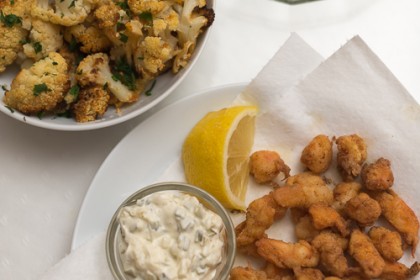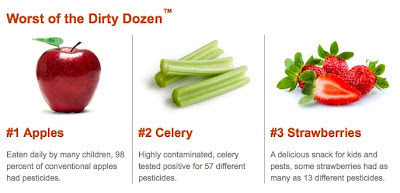I am sure that we have had conventional (non-organic/sprayed) grapes here or there over the past three years while visiting friends or relatives, so when my son grabbed a bunch while shopping I let him put them in our cart. I know the dangers of pesticides and am usually pretty strict about buying organic–especially for the top 15 fruits and vegetables on the dirty dozen list which includes apples, celery, strawberries, grapes, potatoes and lettuce. If we eat some conventional produce at a restaurant or a friend’s house it’s not a big deal because the bulk of our food that we eat day in and day out at home is organic. But, I hadn’t seen organic grapes in months so I figured non-organic grapes as a treat might, in some ways, be better than the sugary treats my kids eat.
Unfortunately, my son got hives after eating the grapes. Of course, I can’t be sure it was the grapes but all the other food we eat day in and day out is pretty consistent. The non-organic grapes were the only new food.
Pesticides are invisible so it is often hard to see the dangers in something that is so intangible–unless you are super sensitive–that is why education about the dangers of pesticides is so important. Looking at the chart at the website What’s on my food? It looks like there is quite a range when it comes to pesticide residue. So while some non-organic grapes might have a low level of pesticide others might have a super high level. Which might be why my son had such a strong reaction to these grapes and be visibly unaffected by other conventional grapes in the past.
Apples are the worst–at the top of the list of dirty dozen. 87.9% of the domestic conventional apples had Thiabendazole on it which is a probably carcinogen and developmental or reproductive toxin. But, organic apples are pretty easy to find. To see the whole dirty dozen list go to Environmental Working Group.
Of course, everyone is different. Some people have better detoxification systems than others. But, a study out of Harvard says pesticide exposure may contribute to ADHD in children–and we know that this a rampant problem in children. 1 (And, come to think of it, my energetic six year old does seem to have significantly more energy when I am visiting relatives who are less fanatic about organic produce. Instead of packing more toys maybe I need to pack some organic strawberries and apples!)
I have read, pesticide exposure leaves your body in a few days so buying organic pays off pretty quickly. You can do your own experiment but going organic for a week or two and seeing if it makes a difference in chronic health issues. Or make a point of buying organic for the produce you eat most often if you don’t feel like you can buy all organic.
Well, after the hives, I guess now I have another reason for being 100% organic. Maybe we are lucky that we are so sensitive.
According to What’s on my food?
“Q: How much pesticide exposure is too much?
A: Depends on the pesticide. Depends on the person. Depends on the timing and type of exposure.
What we do know is this: Pesticide regulations in the U.S. are well behind much of the rest of the industrialized world. This is mostly because agrichemical corporations like Monsanto have too much influence in Washington, but also because pesticide regulation in the U.S. does not adequately account for things like additive and synergistic effects.
Since the Environmental Protection Agency (E.P.A.) regulates most chemicals on a chemical-by-chemical basis, the combined and cumulative effects of a mixture of pesticides are nearly impossible for them to address – and so they usually don’t. 1″2
1. http://pediatrics.aappublications.org/content/early/2010/05/17/peds.2009-3058.abstract
2. http://www.whatsonmyfood.org/howmuch.jsp





Wholesale Organic Food - Pesticides are dangerous to health.Organic produce very less pesticide and so good for health…